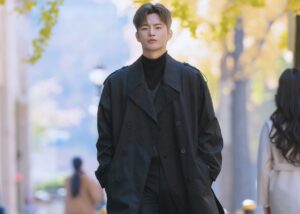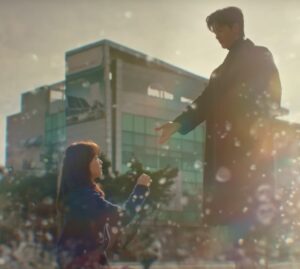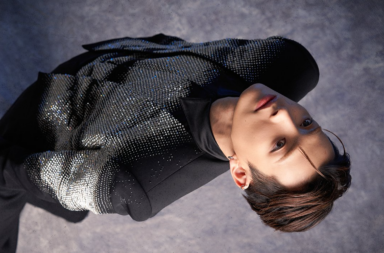
It is something of a drama trademark to throw a lot of ingredients into the story pot. Dramas are not shy about genre melding, mood jumping, plot layering, or endless trope over-using. This exuberant, if often messy, nature is part of why dramas are so beloved all over the world. They just can’t be contained, not within the borders of South Korea, and not within the structures of traditional storytelling.
Even so, Doom at Your Service stands out for tackling a particularly intense combination of qualities. The show is a fantasy that stings with bitter realism, a romance that frequently feels like a thriller, and a tragedy that often brims with absurd comedy and magical wonder. In its first four episodes, Doom at Your Service sometimes falters under the weight of its packed narrative load. It struggles with pacing, and doesn’t always smoothly manage its many quick emotional leaps. Overall though, the show works, achieving balance between its many elements, and creating a distinctive and engaging story for viewers to dive into.
One reason for Doom at Your Service’s success is its well-drawn cast of characters. Tak Dong-kyung (Park Bo-young) may have the down-on-her-luck set up of many typical drama heroines, but her characterization is refreshing. Dong-kyung isn’t unreasonably sunny in the face of tragedy, nor is she a self-pitying damsel in distress. She’s pragmatic and resourceful, jaded but still open to and capable of deep love, the owner of a wry sense of humor and an admirably open mind.

Dong-kyung is a very likable protagonist. She’s also an ideal main character for a show like Doom at Your Service that is juggling genres and emotional tones. Dong-kyung’s down-to-earth perspective automatically adds a sense of reality to the drama’s more fantastical parts. A potentially apocalyptic contract with the god of doom is a problem unlikely to be encountered in the real world, but who hasn’t tried to tackle a big issue by making a list and starting to jot down notes and draw out potential scenarios, like Dong-kyung does?
She is also a character that lives very much in the moment, in part due to her practical streak, and in part as a coping mechanism to handle the oversize share of trauma she carries. This means that Dong-kyung can switch between various moods abruptly yet, because of her characterization, convincingly. The result is scenes that indulge Doom at Your Service’s tone shifting tendencies in a way that actually strengthens Dong-kyung’s character arc.
As an example, Dong-kyung’s introduction to cohabitation with Myul Mang (Seo In-guk) is an emotional rollercoaster. It morphs from a cutely enthusiastic tour of his luxurious lair, to exasperated family-related hijinks, to pouty bickering over logistics, to a fearful life and death argument, to a solemn philosophical conversation, to a tentative but peaceful solidarity, all in 20 minutes. That’s a lot, but it doesn’t feel forced, and it actually sheds light on both the obstacles and the points in favor of Dong-kyung and Myul Mang’s complicated budding relationship.

Speaking of Myul Mang, Doom at Your Service’s male protagonist is every bit as well drawn and useful to the drama’s balancing act as Dong-kyung. As of episode four, significantly less is known about Myul Mang compared to his counterpart. That is no doubt a part of the drama’s long game. Still, Myul Mang makes quite the impression.
One of the most interesting things about Myul Mang so far is just how vulnerable this diety of doom is. Certainly, he has his moments of glamour and fearsome magic, but it quickly becomes clear that Myul Mang is tragically trapped. As the literal manifestation of doom, he himself is doomed to destroy anything he comes near, which means anything or anyone he might cherish is in danger if he approaches. Retirement is not an option according to Myul Mang’s god boss (Jung Ji-so), who herself is bound by the rules of fate to an ailing human body.
Despite constantly claiming to be emotionless, it is quite clear that Myul Mang is actually tortured by loneliness, despair, and rage. He manifests his pain in surprisingly petty ways, mostly by verbally lashing out, especially at Dong-kyung. These outbursts can be terrifying thanks to his godly powers, but they are also pitiful because of their immaturity, not to mention their failure to even scratch the surface of his problem.

It is worth noting that in the case of both Myul Mang and Dong-kyung, Doom at Your Service has the ability to push unsympathetic behavior pretty far because of the inherent likability of actors Park Bo-young and Seo In-guk. That’s a great storytelling freedom to have, and it allows Myul Mang in particular to emerge as a fascinating antihero even with most of his backstory left to be told. Like Dong-kyung, he also helps Doom at Your Service smoothly bridge the gaps between many of its elements, wedding fantastical magic with emotional realism, and charismatic nihilism with poignant pathos.
If Myul Mang and Dong-kyung exemplify the compelling and tricky balance that the whole of Doom at Your Service is aiming for, the other three characters of note currently lean firmly towards the romantic comedy and realistic drama side of the show. Love triangle members Cha Joo-ik (Lee Soo-hyuk), Lee Hyun-kyu (Kang Tae-oh), and Na Ji-na (Shin Do-hyun) are just starting to play a more prominent role in Doom at Your Service’s plot, and so far they’ve all been delightful. Joo-ik and Hyun-kyu’s hot and cold bromance and Ji-na’s friendship with Dong-kyung are especially fun.
That being said, it will be interesting to see if this trio ever interact with Doom at Your Service’s fantasy sector. It is not clear how they would fit into that part of the story, but isolating them completely risks throwing off the show’s golden balance. That choice would also be a warning sign of lazy writing, as the love triangle could become a default way to lighten the mood compared to the presumably intense and fantastical trajectory of Myul Mang and Dong-kyung. But let’s not head down a dark path of doom-filled predictions before it’s necessary!

Besides its well-written and impeccably acted characters, Doom at Your Service deserves heaps of praise for its beautiful visual quality. Director Kwon Young-il previously faced some criticism for his experimental camerawork and lighting in 2019’s Search: WWW. It’s really a matter of personal opinion whether Search: WWW’s unusual look pleases or irritates, but it is probably fair to say that Kwon’s style is more naturally suited to a magical realist show like Doom at Your Service than a workplace drama such as Search: WWW.
His whimsical ways and attention to detail are a boon for Doom at Your Service. While the show’s characters keep its story grounded in relatable emotions, Kwon’s directing makes Doom at Your Service’s most fantastical scenes soar. The dramatic collision sequence at the end of episode one comes to mind. The scene would be great already thanks to strong acting and writing, but Kwon’s visual flair takes it to another level, particularly with the clever use of time-stopped water and soap bubbles to heighten the romanticism of the unfolding event.

Episode four’s dream sequence is also a masterclass in visual storytelling. Kwon first uses romantic drama staples to light and film Myul Mang and Dong-kyung in amusingly pedantic ways. Then, in the climactic scene, Kwon plays with color in an extraordinarily effective manner to convey a sense of tragic wonder, and to enforce the extreme experiential distance yet growing sympathy between Myul Mang and Dong-kyung.
Episode by episode, Doom at Your Service is casting a unique spell. It has gathered a fantastic collection of drama assets, including strong writing, inventive direction, a stellar ensemble cast, and a packed but balanced narrative, and it’s putting them all to good use. Only time will tell if the show can keep up the good momentum, but no doubt, this is a drama that has the potential to be something truly special.
(Images via: tvN, Viki)


